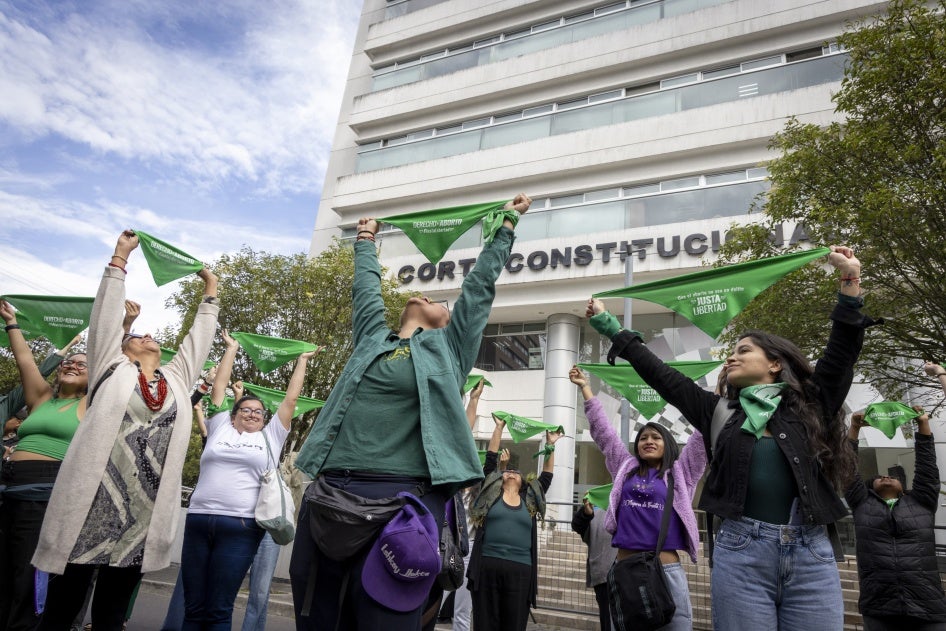(Quito) – The government of Ecuador has an obligation to decriminalize abortion in all circumstances, and to remove all barriers that prevent access to this essential healthcare service, Human Rights Watch said today in an amicus brief submitted to the Constitutional Court of Ecuador.
The Human Rights Watch brief supports a lawsuit filed by Justa Libertad, an Ecuadorian coalition of eight civil society organizations, in March 2024, challenging the criminalization of abortion. Currently, abortion is penalized in Ecuador by up to three years in prison, with exceptions when the life or health of the pregnant woman is at risk or, after a 2021 Constitutional Court ruling, when the pregnancy is the result of sexual violence.
“Ecuador should comply and align its domestic laws and policies with its international human rights obligations to decriminalize abortion,” said Stephanie Lustig, women’s rights research assistant at Human Rights Watch. “Even those who legally qualify for abortion care face significant practical barriers, as healthcare personnel and institutions often impose their beliefs that, once pregnant, women and girls are obligated to become mothers.”
The Justa Libertad case asks the Constitutional Court to declare unconstitutional Article 149 of Ecuador’s Criminal Code, which criminalizes consensual abortion. This crucial initiative seeks to ensure that women, girls, and other pregnant people can access safe abortion care.
In a 2021 report, Human Rights Watch documented the severe consequences of the criminalization of abortion in Ecuador, including by increasing maternal mortality and morbidity; cutting women, girls, and pregnant people off from essential services like health care and education; and violating their rights to medical confidentiality and due process. The criminalization of abortion in Ecuador has also led to significant barriers to accessing abortion and post-abortion care, even in the exceptional cases in which abortion is legally permissible. These barriers include stigmatization, mistreatment by healthcare providers, and an overly narrow interpretation of legal exceptions for abortion, which, in practice, leads to denial of this essential service.
The criminalization of abortion in Ecuador reinforces the stereotype that women and girls’ roles are limited to motherhood and punishes those who defy these stereotypes, disregarding their rights to privacy, non-discrimination, and reproductive freedom, Human Rights Watch found. This not only restricts women, girls, and other pregnant people’s reproductive autonomy, but also imposes unjust burdens on them to bear unwanted pregnancies, often without adequate support and resources.
Several United Nations committees, including the Committee on the Rights of the Child and the Committee on the Elimination of Discrimination Against Women (CEDAW), have concluded that the criminalization of abortion jeopardizes multiple human rights and have consistently urged countries, including Ecuador, to decriminalize abortion in all circumstances.
The CEDAW has observed that when a country fails to provide or criminalizes services specifically needed by women, it violates their reproductive rights and constitutes discrimination. Both the CEDAW and the United Nations Committee against Torture (CAT) have concluded that the denial or delay of safe abortion and the forced continuation of pregnancy not only violate women’s sexual and reproductive rights, but also, depending on the circumstances, may amount to torture or cruel, inhuman, or degrading treatment. Abortion restrictions, CAT highlights, can cause severe physical and mental anguish, and may be incompatible with a government’s duty to uphold the right to freedom from torture and other cruel, inhuman, or degrading treatment or punishment.
In the amicus brief, Human Rights Watch highlights the negative impact unwanted pregnancies and forced motherhood have on girls’ physical and mental health. This situation leaves them vulnerable to higher risks of maternal mortality, anxiety, depression, post-traumatic stress disorder, and suicide. In Ecuador, a 2015 study by Fundación Desafío reviewed the medical records of 139 girls who were forced into motherhood before the age of 14 and found that over 90 percent of them showed “depressive symptoms” and “adjustment disorder.”
Girls who are forced into motherhood often drop out of school and suffer greater levels of violence and poverty. Forced motherhood in girls perpetuates cycles of discrimination and poverty. In essence, the criminalization of abortion institutionalizes discrimination by denying women, girls, and pregnant people the freedom to make decisions about their reproductive health and life paths, perpetuating systemic gender-based inequalities.
The criminalization of abortion in Ecuador also disproportionately affects women and girls living in conditions of poverty and those from marginalized ethnic groups. In 78 cases reviewed, Human Rights Watch found that a majority of those accused of abortion-related crimes were young women, with a significant percentage from regions with high poverty rates and predominantly Indigenous or Afro-descendant populations.
The prosecution of women and girls seeking medical care for pregnancy complications, regardless of whether they are seeking an abortion, exacerbates existing social inequalities, perpetuating cycles of poverty and inequality.
“Ecuador's criminalization of abortion worsens social inequities and violates fundamental human rights,” said Lustig. “It underscores the urgent need for the full decriminalization of abortion to ensure equitable access to reproductive health care and uphold the rights of all individuals, regardless of their economic status or ethnic background.”







